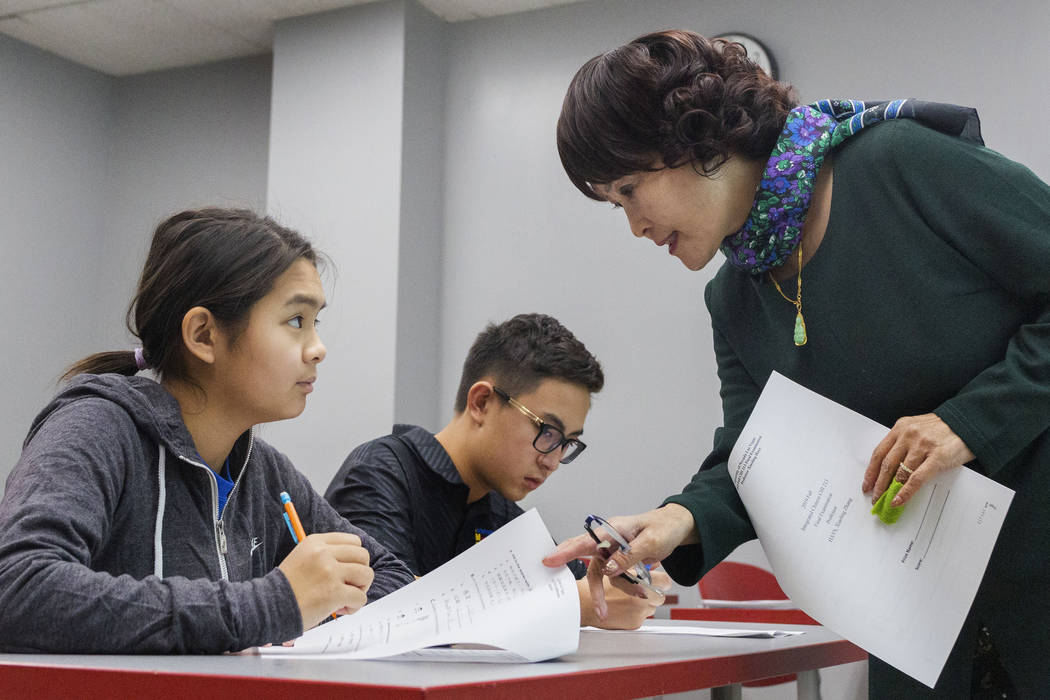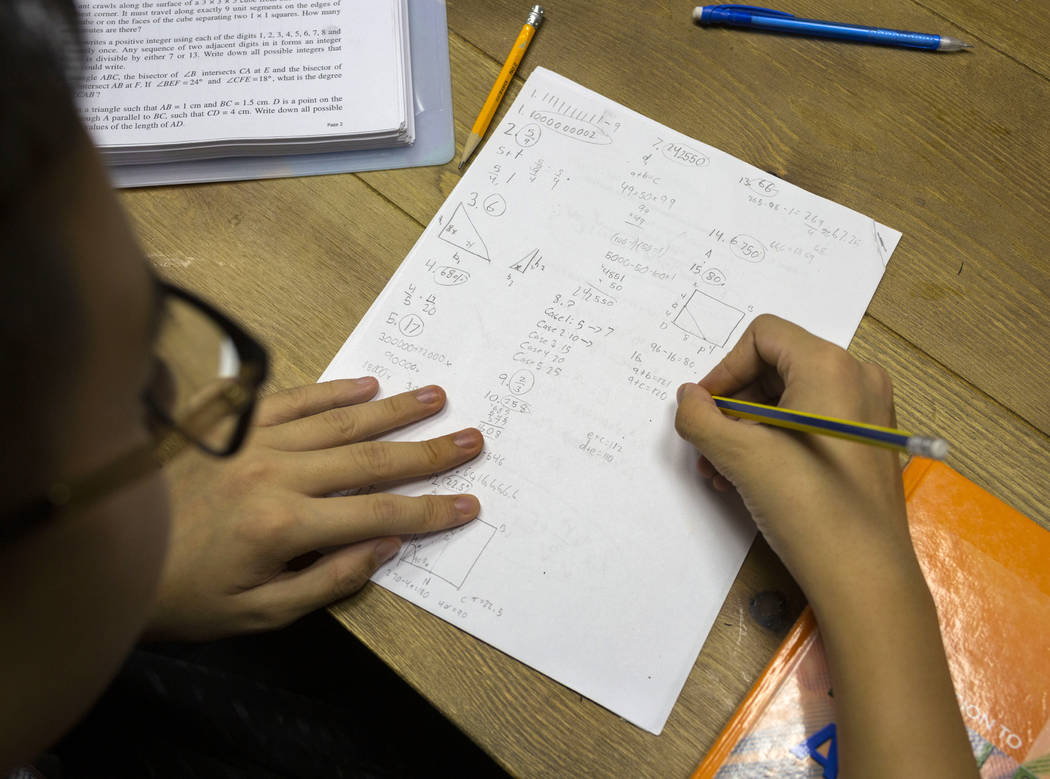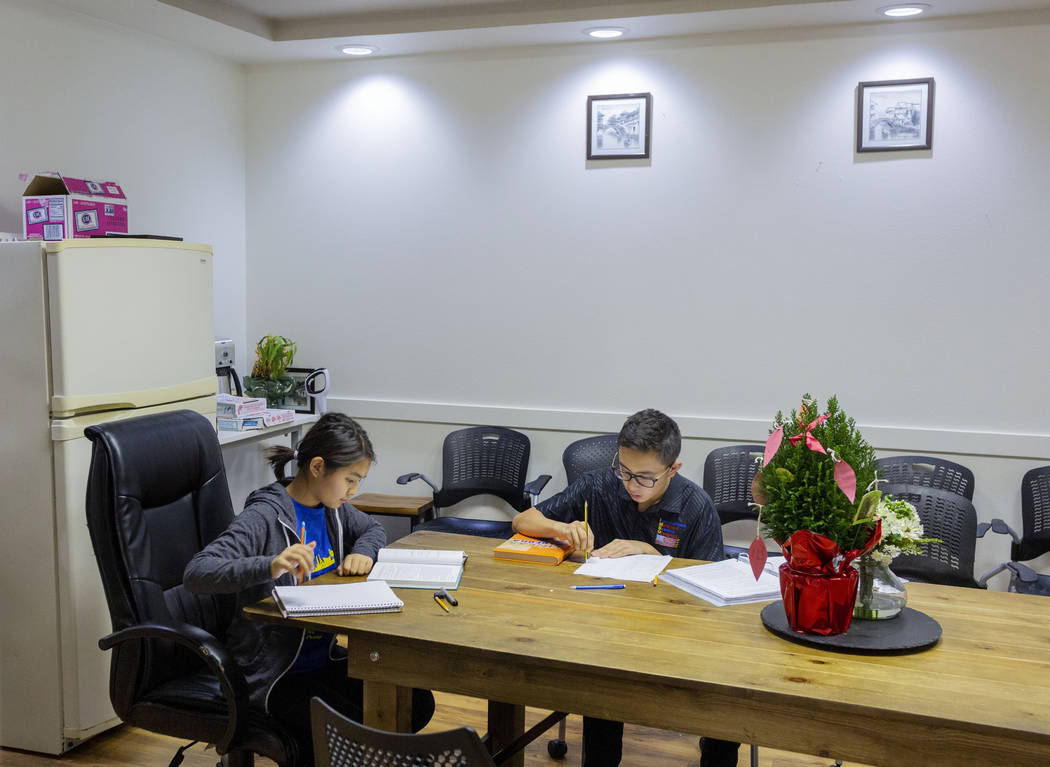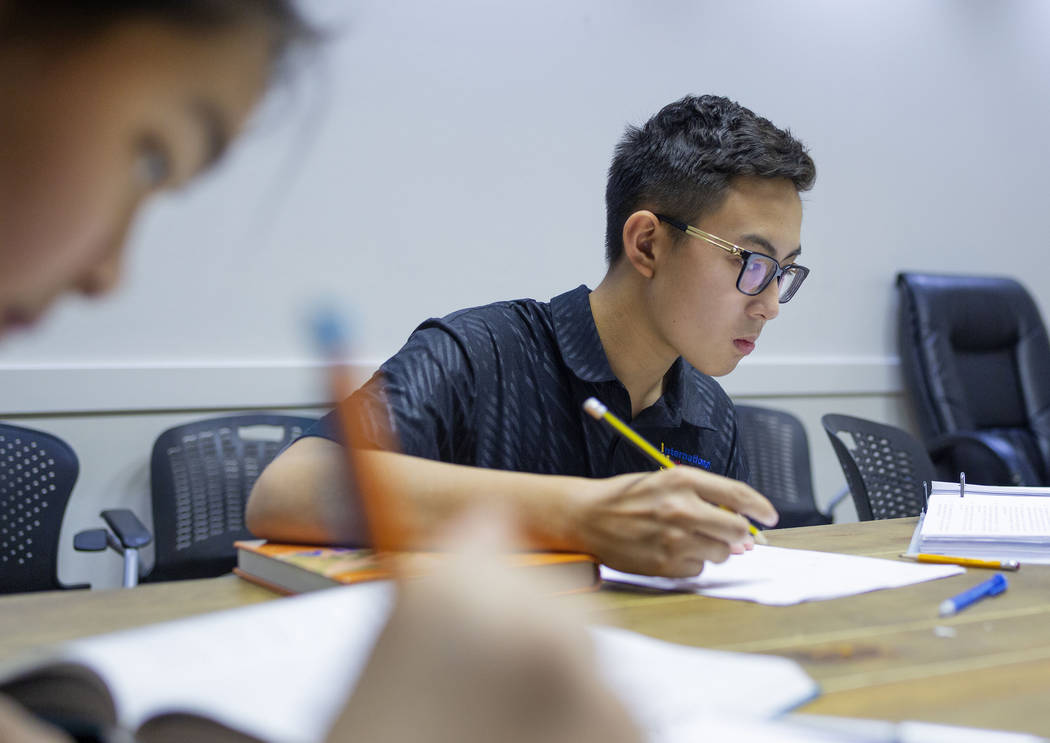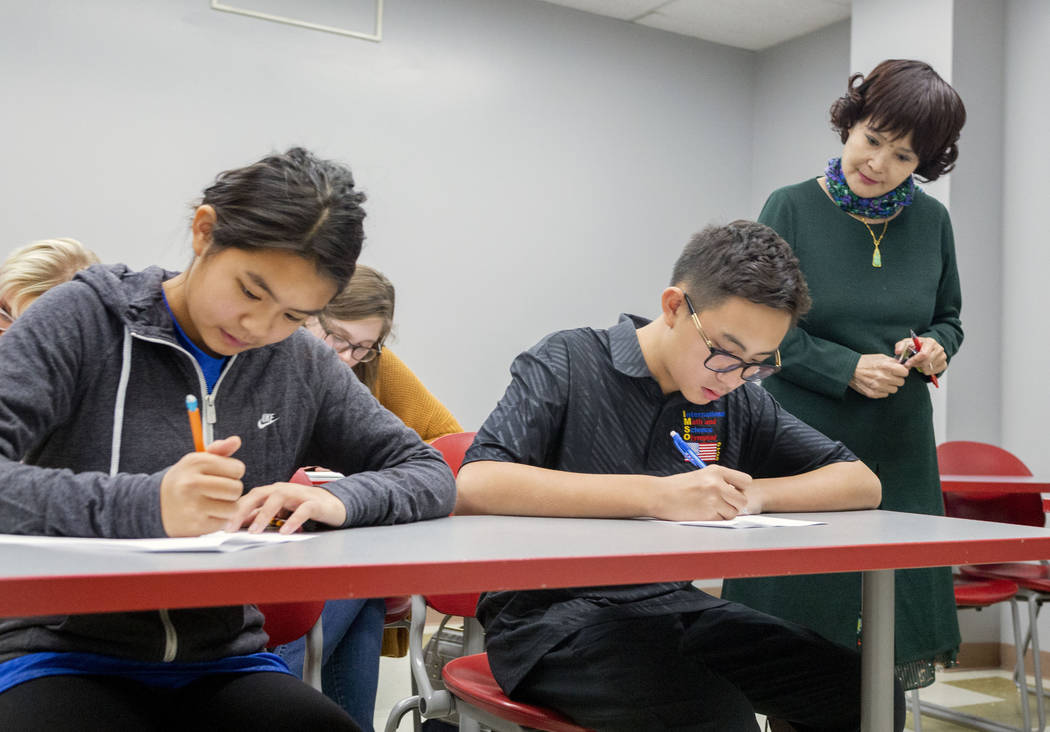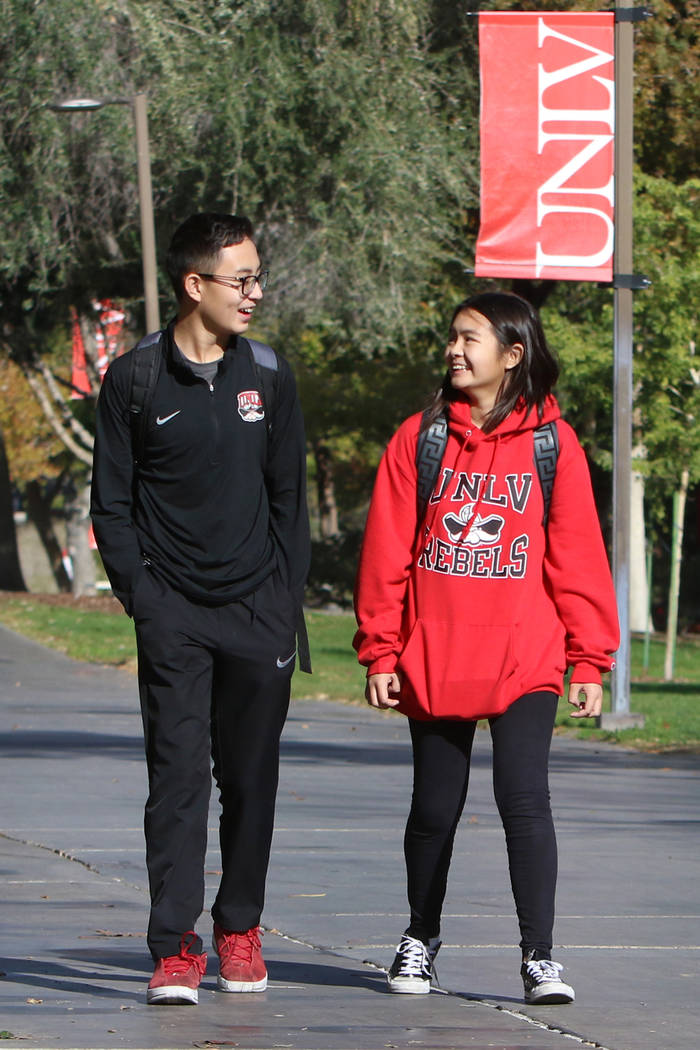At 12 and 13, siblings among youngest full-time students at UNLV
Dr. Ming-Wei Wu doesn’t want his children walking alone at UNLV.
He drives them to campus, and escorts them to and from their classes. For most college students, that arrangement would be unusual and restrictive — and they’d probably rebel.
But Wu’s children aren’t your typical college students. They’re only 12 and 13.
The two Las Vegas siblings — 12-year-old Shenlone Wu and 13-year-old Shenmei Wu — are both full-time students at UNLV. They each have an IQ above 140, which is considered genius or near-genius level.
“I don’t tell people how old I am, but once they find out, they kinda look at me as a kid,” Shenlone wrote in a Thursday email to the Las Vegas Review-Journal, following up on an interview with the newspaper. “This makes me want to do better. I want them to respect me as a college student, regardless of my age.”
The siblings wrapped up fall semester last week by taking final exams in classes such as biology, Chinese and medical terminology. And Shenlone took calculus, while his sister took pre-calculus.
Shenlone and Shenmei started taking UNLV classes part time in spring 2018 when they were in fifth and sixth grades, respectively. And this school year, they’re enrolled full time as non-degree-seeking students.
It’s rare for students as young as the Wu siblings to take UNLV classes, said Dan Gianoutsos, associate dean of the university’s Academic Success Center.
Only three or four middle school-aged students — including the Wu siblings — took UNLV classes during fall semester, he said.
“That’s a high number,” Gianoutsos added. “There’s a lot of years when there’s none.”
Shenlone is the youngest student currently enrolled at UNLV, school officials say, but there’s no record of the youngest student ever enrolled there.
‘You get the hang of it’
Before becoming full-time students at UNLV, Shenlone and Shenmei split their time among the university, Becker Middle School in Summerlin and Palo Verde High School.
When Shenmei was in middle school, she “thought it was kind of easy,” she said during a recent interview. She was learning new things, but “the tempo was a bit slow.”
At UNLV, Shenmei said it was hard initially to have fewer assignments and a larger portion of her grades based on tests. But, she added, “You get the hang of it.”
And unlike middle school, she now stays up until 10 or 11 p.m. to study. “I will admit I have been staying up later than I used to,” she said.
Adjusting to UNLV’s large campus was a big transition, too.
“At first, it was like really hard,” Shenlone said. Shenmei added: “It was kind of scary, in a sense.”
In his email to the Review-Journal, Shenlone wrote: “In fifth grade, my father didn’t want me to go to college. It was my idea because I was bored. After I was enrolled, I became really nervous. However, I had a tutor so the transition to college was easy.”
He got a few B’s and one C in past college classes but said they motivated him to try harder. He expects he’ll have straight A’s from his fall semester classes once final grades are out.
He said coursework seems to be easier for him now and relatively stress-free — especially, in math.
“Math just comes pretty easy,” he said during the recent interview with his sister.
The pre-teen plans to continue on with math classes. Calculus I, he said, was just “the tip of the iceberg.”
Sibling rivalry
As for Shenmei, she said she didn’t want to go to UNLV but also didn’t want her brother to beat her to it. It was classic sibling rivalry, she said.
Shenmei said she doesn’t have her brother’s grades in math but expects she’ll likely get straight A’s in her fall semester classes, too.
In addition to their UNLV classes, the siblings took an English literature class online during fall semester through Los Angeles City College, and they plan to take a communication class this spring. Their father said he would like to see them join the college’s team to participate in competitions through the American Mathematical Association of Two-Year Colleges.
Shenmei and Shenlone’s father is a wound care surgeon, and their mother, Julie, is a primary care physician. They also have two younger siblings, ages 10 and 7.
The goal isn’t for the two older siblings to earn a college degree at a young age. They’ll apply to college at the same time as their peers when it’s age-appropriate, their father said.
“They’re doing this just to challenge themselves,” he said.
By the time they’re high school-aged, Wu plans to have them enroll part time in high school and part time at UNLV. His goal is for them to finish all of their undergraduate math classes by the time they graduate from high school.
Once they’re in college, Wu said, they’ll essentially be reviewing content.
The two siblings are enrolled in UNLV’s dual enrollment program, which is typically open to high school freshmen through seniors. It allows students to earn high school and college credits simultaneously.
When there’s a special request to accept a “super high-achieving student” who’s younger, that decision is made by the university’s admissions office, Gianoutsos said.
Typically, dual enrollment students take about two classes each semester. The pair got special permission to enroll full time.
Wu said it’s rewarding to see his children succeed, but it comes with a cost. He said he sacrifices a lot of time away from work.
On Dec. 6, Wu waited on campus as his children prepared for finals week. As Shenmei and Shenlone talked with a Review-Journal reporter, it was just two hours before Wu was scheduled to perform a 12:30 p.m. amputation surgery.
For parents whose children are in the dual enrollment program, it’s not just the time commitment. They also pay full price for tuition, since no waivers are available.
Wu said his children give full effort, and it would be a shame if he didn’t offer the same back to them.
“The way I see life, it’s career and family,” he said.
‘Math, first and foremost’
At UNLV, the siblings take classes that mesh with their interests. “At the end of the day, it’s whatever they like,” Wu said.
For the brother and sister, one subject stands out: “Their forte is math, first and foremost,” their father said.
Shenlone said he wants to pursue “something math-y” as a career.
Shenmei does well in math, too, but her father says she also excels in English and public speaking, and would likely enjoy being an attorney someday. Shenmei has taken college classes such as psychology and speech.
Regardless of what career they pursue in the future, Wu said, they need to have a love and passion for what they do.
When they’re not at UNLV, Shenmei and Shenlone spend their time either at their family’s Summerlin home or at their parents’ medical office on South Jones Boulevard in the Spring Valley area.
They receive coaching in chess, piano and Chinese musical instruments at home, and in math and Chinese language at their parents’ office.
On Monday, the siblings were at their parents’ office preparing for two final exams that day — Chinese and biology.
Shenmei and Shenlone are state chess champions, compete in international golf events, compete in piano and play musical instruments.
Shenlone was part of a six-person team from Las Vegas that represented the United States in the 16th annual International Mathematics and Science Olympiad Nov. 26-Dec. 1 in Hanoi, Vietnam. The competition was for students through age 13.
The Wu family also went to Belize over the summer for a medical mission trip. Wu said he wants his children to realize how fortunate they are and to see how others live.
When it comes to hobbies, Shenlone is a gamer. He said his parents limit his gaming time to two hours a day.
As a reward for winning a silver medal at the math and science competiion, his parents are letting him compete in Super Smash Bros. at the HyperX Esports Arena at the Luxor.
“One reason I compete so much in math and go to UNLV is that I get rewarded,” Shenlone said in his email.
Shenmei loves Legos, and her bedroom is full of them. Her biggest Lego building accomplishment thus far is the Hogwarts Castle of Harry Potter fame.
She also loves reading and spends time trying to persuade her mother to buy her more books.
And she enjoys listening to music from her father’s Spotify account. Because of him, she listens to a wide variety of music, she said, including oldies, 80s and 90s, heavy metal, rap and classical.
‘Top of the class’
Sometimes, Shenmei and Shenlone’s classmates and professors don’t realize how young they are. But if they find out, “they’re all surprised — some more than others,” Shenlone said.
UNLV math professor Monika Neda had Shenlone in her Calculus I class during fall semester.
“I’ve never had such a young student in calculus,” said Neda, who has been at the university since 2007. It’s even rare to have a high schooler in her calculus class.
Not only is Shenlone taking calculus, but he’s the “tip of the top of the class,” Neda said, along with a couple of other students.
And there’s something else Neda has noticed about Shenlone: “just the way he solves the problems with such an ease,” she said.
Neda didn’t know Shenlone’s age when he enrolled. She approached him one day when students were working in groups, because he looked young, and she asked if he was in high school. His response? “Not really,” Neda recalled. But Shelone didn’t elaborate or reveal his age.
Later during fall semester, Wu took a few photos while Shenlone was in calculus class and told Neda that Shenlone would have to miss class in order to compete in the International Mathematics and Science Olympiad. Neda made an announcement about it during class, and students applauded.
Wu shared something else with Neda and the class: Shenlone is only 12.
Shenlone’s classmates looked amazed when Wu announced it, Neda said.
Support for young students
Once a student applies to UNLV’s dual enrollment program, Michael Hack — coordinator of academic transitions and engagement at the Academic Success Center — meets with them to ask questions and get a feel for whether they’re prepared for college classes.
The recommendation is for dual enrollment students to have a minimum 3.0 GPA in their high school core classes, such as math and English.
“We use that as an indicator to see if they’ll be able to perform well in their classes,” Hack said.
The Wu siblings are “definitely high achieving,” Hack said, and ambitious with what they want to accomplish.
“They were very dedicated to their education and achieving the highest academic marks they could have,” he said.
They also show courage by taking classes with college students, he said. “For them, I think it’s just finding their place in their classes.” That includes feeling comfortable enough to contribute to class discussions.
Dual enrollment students receive support — including tutoring and advising — through the university’s Academic Success Center.
“They have a lot of support because it’s really important to us that they’re successful,” Gianoutsos said, and have a great college experience. Plus, their grades end up on their permanent college transcript.
As Shenmei and Shenlone walked Dec. 6 between their classes and UNLV’s Student Union Building, their young age was apparent. But one attribute helps Shenlone blend in: He towers in height.
When the siblings started taking classes at UNLV, Shenlone was just 4 feet, 8 inches tall. Now, he’s 5 feet, 8 inches tall, meaning he grew a foot in less than two years. His sister, though, is only 5 feet, 2 inches tall.
Shenmei enjoys how UNLV is different from middle school. “I just think it’s a lot more interesting,” she said.
When they’re not in class or studying, the siblings still spend free time with their middle school friends – just not quite as often as they used to.
It’s not too surprising. After all, they’re college students.
Contact Julie Wootton-Greener at jgreener@reviewjournal.com or 702-387-2921. Follow @julieswootton on Twitter.
Who's the youngest college graduate?
The youngest person to earn a college degree — according to Guinness World Records — was Michael Kearny, who graduated in 1994 at age 10 with a bachelor's degree from the University of South Alabama.
There are reports of a 9-year-old Belgian boy — Laurent Simons — who was slated to graduate with a bachelor's degree this month, but he dropped out due to an issue that arose with his graduation date and a conflict over it with university administrators.
International Math and Science Olympiad
Shenlone Wu, 12, was among a six-person team from Las Vegas that represented the United States in the 16th annual International Mathematics and Science Olympiad Nov. 26-Dec. 1 in Hanoi, Vietnam.
The Las Vegas team competed in the mathematics competition. In addition to a local coach, Hikmet Erdogan from RootSTEM Academy provided training for team members.
Here are the competition results for the Las Vegas team: Chris Bao from Hyde Park Middle School (gold), Shenlone (silver), Parth Joshi from Coral Academy of Science Las Vegas (silver), Vanita Indrakumar from Hyde Park Middle School (bronze), Brandon Lee from The Meadows School (bronze) and Sanjeev Chundu from Hyde Park Middle School (bronze).
The U.S. will host the International Mathematics and Science Olympiad in 2020 in Las Vegas.



